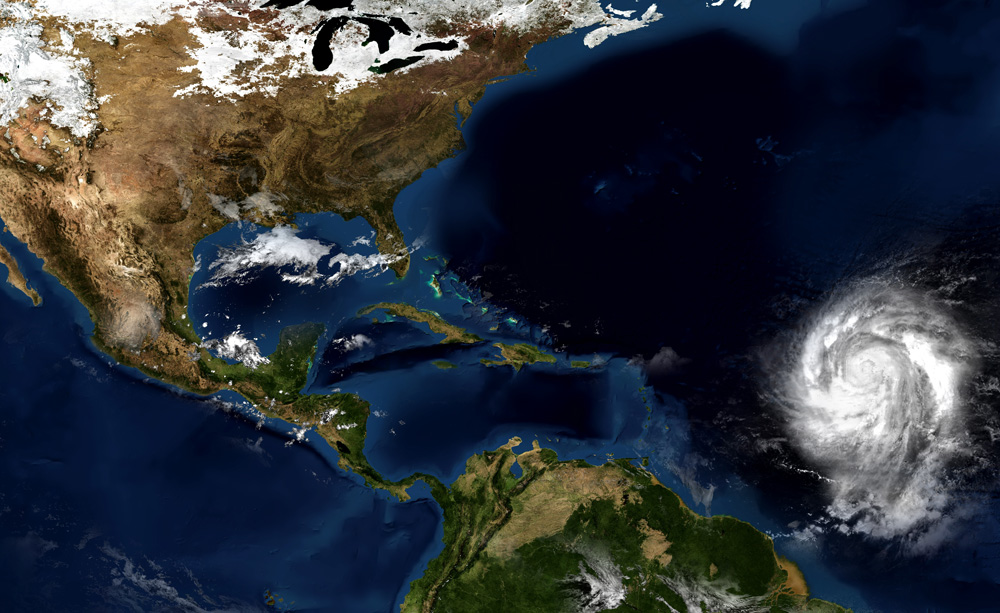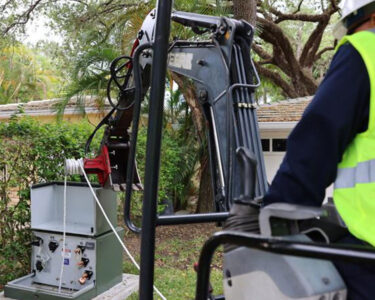- With Andrea already taken by an early season depression, the 2019 season moves on to names: Barry,Chantal, Dorian, Erin, Fernand, and Gabrielle.
- NOAA predicts a near-normal season, with a “likely range of 9 to 15 named storms (winds of 39 mph or higher), of which 4 to 8 could become hurricanes (winds of 74 mph or higher), including 2 to 4 major hurricanes (category 3, 4 or 5; with winds of 111 mph or higher).”
- Know your zone! Miami-Dade residents can visit miamidade.gov/hurricane to find their Storm Surge Planning Zone or download the Ready MDC mobile app. Zone A is at the greatest risk for storm surge, while E is less likely to be evacuated.
- Harness the power of the sun! Invest in a solar powered charger to ensure that you’re able to keep in touch post-storm and stock up on solar-powered lighting like the LuminAID solar lanterns (see on Shark Tank!).
- Speaking of phones… Protect important documents by scanning them into your computer or phone as backup before storing them in waterproof containers on high shelves and be sure to take video and photos of your home and valuable objects.
- Any South Floridian worth his hurricane knowledge has sat in a gas line for upwards of an hour only to find the station drained. Download GasBuddy for real time updates of who’s full and who’s on empty.
- The safest spot in your home? The bathtub. Experts recommend getting in your tub with a mattress over the top to protect yourself should debris from your home begin to fall.
- If you or someone you know requires assistance in an evacuation scenario they must register pre-season for the Emergency & Evacuation Assistance Program as pre-registered residents will receive priority.
- This year, South Florida emergency management has sent out door hangers in green and red. Using drones, emergency personnel will be able to fly down hard-hit streets and identify exactly who needs help.
- Don’t forget your furry friends. Make sure pets have their IDs on and have food and medication in healthy supply. FYI: pet evacuation centers take dogs and cats, but also pets including rabbits, ferrets, gerbils, birds, hamsters and more.
10 Things to Know About the 2019 Hurricane Season














 Deering Estate
Deering Estate
 Massage Envy South Miami
Massage Envy South Miami
 Calla Blow Dry
Calla Blow Dry
 My Derma Clinic
My Derma Clinic
 Sushi Maki
Sushi Maki
 Sports Grill
Sports Grill
 The Healthy Kitchen
The Healthy Kitchen
 Golden Rule Seafood
Golden Rule Seafood
 Malanga Cuban Café
Malanga Cuban Café

 Kathleen Ballard
Kathleen Ballard
 Panter, Panter & Sampedro
Panter, Panter & Sampedro
 Vintage Liquors
Vintage Liquors
 The Dog from Ipanema
The Dog from Ipanema
 Rubinstein Family Chiropractic
Rubinstein Family Chiropractic
 Your Pet’s Best
Your Pet’s Best
 Indigo Republic
Indigo Republic




 ATR Luxury Homes
ATR Luxury Homes


 2112 Design Studio
2112 Design Studio
 Hamilton Fox & Company
Hamilton Fox & Company
 Creative Design Services
Creative Design Services
 Best Pest Professionals
Best Pest Professionals
 HD Tree Services
HD Tree Services
 Trinity Air Conditioning Company
Trinity Air Conditioning Company
 Cisca Construction & Development
Cisca Construction & Development
 Mosquito Joe
Mosquito Joe
 Cutler Bay Solar Solutions
Cutler Bay Solar Solutions


 Miami Royal Ballet & Dance
Miami Royal Ballet & Dance
 Christopher Columbus
Christopher Columbus
 Pineview Preschools
Pineview Preschools
 Westminster
Westminster
 Carrollton
Carrollton
 Lil’ Jungle
Lil’ Jungle
 Frost Science Museum
Frost Science Museum
 Palmer Trinity School
Palmer Trinity School
 South Florida Music
South Florida Music
 Pinecrest Orthodontics
Pinecrest Orthodontics
 Dr. Bob Pediatric Dentist
Dr. Bob Pediatric Dentist
 d.pediatrics
d.pediatrics
 South Miami Women’s Health
South Miami Women’s Health

 The Spot Barbershop
The Spot Barbershop
 My Derma Clinic
My Derma Clinic




 Miami Dance Project
Miami Dance Project

 Rubinstein Family Chiropractic
Rubinstein Family Chiropractic
 Indigo Republic
Indigo Republic

 Safes Universe
Safes Universe
 Vintage Liquors
Vintage Liquors
 Evenings Delight
Evenings Delight





 Atchana’s Homegrown Thai
Atchana’s Homegrown Thai
 Baptist Health South Florida
Baptist Health South Florida

 Laser Eye Center of Miami
Laser Eye Center of Miami
 Visiting Angels
Visiting Angels
 OpusCare of South Florida
OpusCare of South Florida

 Your Pet’s Best
Your Pet’s Best





 HD Tree Services
HD Tree Services
 Hamilton Fox & Company
Hamilton Fox & Company


 Creative Design Services
Creative Design Services